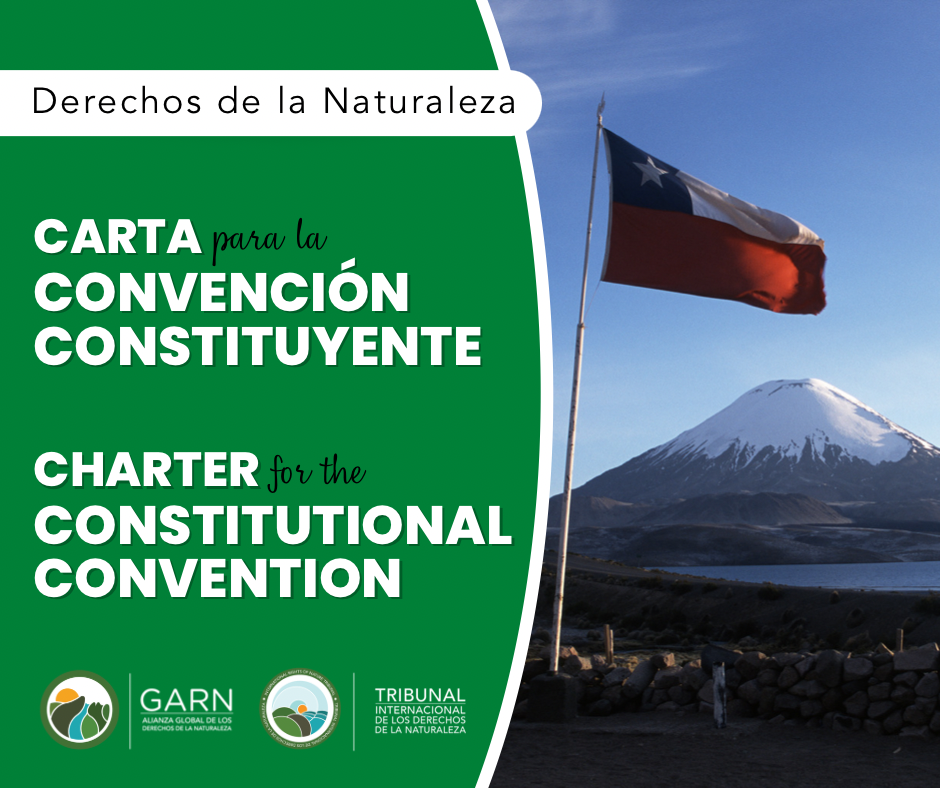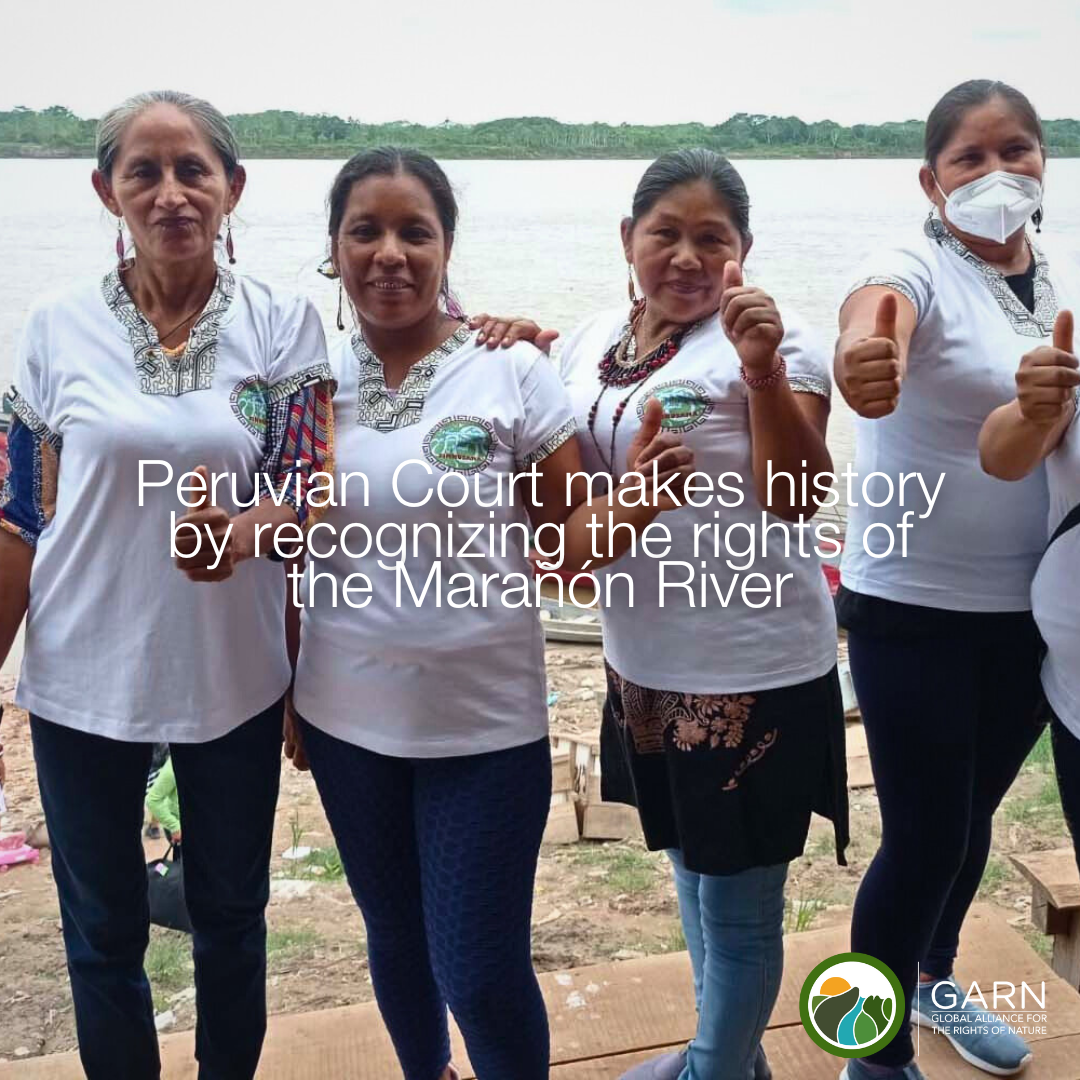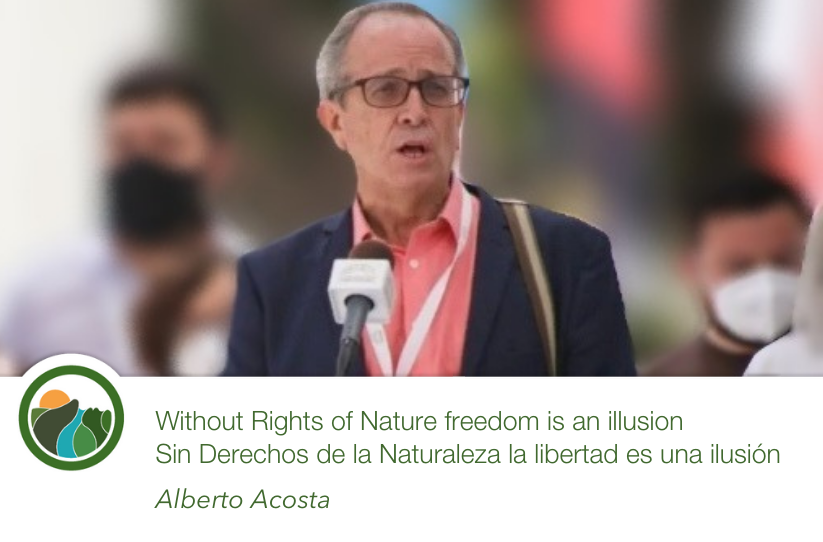Viernes, 24 de marzo 2022
Carta para la Convención Constituyente Chilena
Mucho caminé a la Tierra,
bien no la he querido.
Todavía y con cabellos
blancos la camino.
Camínala tú también,
tú, el mozo, tú, el niño.
“La Tierra” Gabriela Mistral
Vemos con emoción y admiración lo que está logrando el pueblo chileno a través de su Convención Constitucional.
Paulatinamente se recogen las demandas de su sociedad y de sus pueblos. Incluso este proceso se nutre de experiencias y avances de los países de la región en cuestiones tan importantes como los derechos sociales, colectivos y de la Naturaleza, las garantías constitucionales, la limitación al poder político, la profundización de la democracia.
Uno de los problemas más profundos, sentidos y urgentes que no pueden hacerse a un lado tienen que ver con nuestra relación con la naturaleza. Su destrucción pone en riesgo incluso la vida de la especie humana misma. Y esto no es un drama imaginario. Las cumbres de cambio climático nos han dado información de que nuestro planeta tierra está al límite, el Panel Intergubernamental de Cambio Climático (IPCC) lo ratifica de forma contundente. Si uno mira con atención sus efectos, en Chile y en cualquier parte del mundo, ha aumentado la desertificación, ha disminuido la diversidad, estamos ante la sexta extinción masivas de especies, y esto conlleva a enormes impactos en la economía, salud, y producción de alimentos.
Las constituciones siempre han respondido a problemas que se han planteado en distintos momentos. En el siglo XIX fue el tener repúblicas y no colonias, y la respuesta fue reconociendo los derechos civiles y políticos; en el siglo XX fue la desigualdad, y la respuesta fue reconocer los derechos económicos, sociales y culturales. Estos problemas no se han resuelto aún por lo que esos derechos deben seguir siendo reconocidos en la Constitución. Así como el Siglo XX fue el siglo de los Derechos Humanos, el siglo XXI debe ser el siglo de los Derechos de la Naturaleza. Chile da ese paso con el reconocimiento de la Naturaleza como sujeto de derechos.
El articulado aprobado nos inspira:
“Las personas y los pueblos son interdependientes con la naturaleza y forman, con ella, un conjunto inseparable.
La naturaleza tiene derechos. El Estado y la sociedad tienen el deber de protegerlos y respetarlos.”
En primer lugar, reconoce nuestra interdependencia con la naturaleza. Efectivamente, vivimos de ella y sin ella morimos. Aire, agua, alimentos son naturaleza. Sin aire, sin agua y sin los productos de la tierra simple y llanamente morimos. Suena elemental pero lo cierto es que los seres humanos, siendo naturaleza, hemos contaminado el aire, convertido en cloacas nuestros ríos y nuestra alimentación tiene más químicos que de alimentos sanos y naturales. Buen primer inciso.
El segundo es fundamental. “La naturaleza tiene derechos”. Cuando el derecho reconoce que algo tiene derechos, entonces hay que cuidar y proteger. La consecuencia es que surgen obligaciones y el artículo señala tanto al Estado como a la sociedad como responsables. Enunciado poderoso. La naturaleza es entonces un sujeto que se protege y no una objeto que se explota.
Ya son 37 países los que han incorporado de alguna manera este tema a nivel oficial e institucional, sea en su Constitución como Ecuador, en una ley nacional como Bolivia, a nivel de ciudades como México, o a nivel de ecosistemas, ríos, bosques como Colombia, Nueva Zelanda, Brasil, Bangladesh entre varios otros. Recientemente Panamá marcó un hito notable con una poderosa Ley de Derechos de la Naturaleza. Además, hay otras propuestas en marcha para llegar a aceptar constitucionalmente a la Naturaleza como sujeto de derechos, como sucede, para mencionar un caso, en Alemania. Este eco internacional se expande. Chile alentará aún más este proceso al reconocer con claridad que la naturaleza es sujeto de derechos.
Tenemos mucha esperanza en lo que se debate y vota en Chile, ya que serán los articulados que le dan forma y contenido a estos derechos, que detallan cuáles son los derechos de la Naturaleza, como se aplican y quien los representa.
Señoras y señores convencionales, están haciendo historia. Sus hijos y sus hijas, sus nietos y sus nietas recordarán con emoción este momento histórico, cuando sus padres y sus madres, sus abuelos y sus abuelas, del lado de la Madre Tierra, que es la base y el origen de la vida misma.
Alberto Acosta
Pablo Solón
Enrique Viale
Elizabeth Bravo
Ramiro Ávila Santamaría
Esperanza Martínez
Natalia Greene
Cormac Cullinan
Francesco Martone
Alessandro Pelizzon
Nnimmo Bassey
Fiona Wilton
Samanta Novella
Patricia Gualinga
Shrishtee Bajpai
Ashish Kothari
Enrique Leff
Osprey Orielle Lake
Antoni Pigrau
Maristella Svampa
Lorenzo Muelas
Atossa Soltani
Edgardo Lander
Princesa Esmeralda de Rethy
Rocio Silva Santiesteban
Valerie Cabanes
Carolyn Raffensperger
Damien Short
Boaventura de Sousa Santos
Richard Falk
Margaret Stewart
Arturo Escobar
Leonardo Boff
Fernando Antonio de Carvalho Dantas
Lisa Mead
Ute Koczy
Rita Segato
Yaku Pérez
Terisa Turner
Health of Mother Earth Foundation
Nature Rights
CEDENMA
GARN
GARN Latinoamérica
Tribunal Internacional por los Derechos de la Naturaleza
Friday, March 24, 2022
Charter for the Chilean Constitutional Convention
We see with emotion and admiration what the Chilean people are achieving through their Constitutional Convention.
The demands of its society and its peoples are gradually being acknowledged. This process is nourished by the experiences and advances of the countries of the region on important issues such as social, collective, and natural rights, constitutional guarantees, the limitation of political power, and the deepening of democracy.
One of the most profound, heartfelt, and urgent problems that cannot be ignored has to do with our relationship with nature. The destruction of nature puts at risk even the life of the human species itself. And this is no imaginary drama. The climate change summits have given us information that our planet Earth is at the limit, the Intergovernmental Panel on Climate Change (IPCC) ratifies it forcefully. If one looks closely at its effects, in Chile and in any part of the world, desertification has increased, diversity has decreased, and we are facing the sixth mass extinction of species. This leads to enormous impacts on the economy, health, and food production.
Constitutions have always responded to problems that have arisen at different times. In the 19th century, it was having republics and not colonies, and the response was to recognize civil and political rights; in the 20th century it was inequality, and the response was to recognize economic, social, and cultural rights. These problems have not yet been solved, so these rights must continue to be recognized in the Constitution. Just as the 20th century was the century of Human Rights, the 21st century must be the century of the Rights of Nature. Chile takes this step with the recognition of Nature as a subject of rights.
The approved article inspires us:
“Individuals and peoples are interdependent with nature and form, with it, an inseparable whole. Nature has rights. The State and society have the duty to protect and respect them.”
First, it recognizes our interdependence with nature. Indeed, we live from it and without it, we die. Air, water, and food are nature. Without air, water, and the products of the earth, we simply die. It sounds elementary but the truth is that human beings, being nature, have polluted the air, turned our rivers into sewers and our food has more chemicals than healthy and natural food.
The second is fundamental. “Nature has rights.” When the law recognizes that something has rights, then it must be cared for and protected. The consequence is that obligations arise and the article points to both the State and society as responsible. This is a powerful statement. Nature is then a subject to be protected and not an object to be exploited.
There are already 37 countries that have incorporated this issue in some way at an official and institutional level, whether in their Constitution, such as Ecuador; in a national law, such as Bolivia; at the level of cities, such as Mexico; or at the level of ecosystems, rivers, forests, such as Colombia, New Zealand, Brazil, Bangladesh, among many others. Panama recently marked a notable milestone with a powerful Law on the Rights of Nature. In addition, there are other proposals underway to constitutionally accept Nature as a subject of rights, as is the case, to mention just one, in Germany. This international echo is expanding. Chile will further encourage this process by clearly recognizing that Nature is a subject of rights.
We have great hope in what will be debated and voted on in Chile since it will be the articles that give form and content to these rights, which detail what the rights of Nature are, how they are applied and who represents them.
Ladies and gentlemen of the Convention, you are making history. Your sons and daughters, your grandsons and granddaughters, will remember with emotion this historic moment, when their fathers and mothers, their grandfathers and grandmothers, stood on the side of Mother Earth, which is the basis and origin of life itself.
Alberto Acosta
Pablo Solón
Enrique Viale
Elizabeth Bravo
Ramiro Ávila Santamaría
Esperanza Martínez
Natalia Greene
Cormac Cullinan
Francesco Martone
Alessandro Pelizzon
Nnimmo Bassey
Fiona Wilton
Samanta Novella
Patricia Gualinga
Shrishtee Bajpai
Ashish Kothari
Enrique Leff
Osprey Orielle Lake
Antoni Pigrau
Maristella Svampa
Lorenzo Muelas
Atossa Soltani
Edgardo Lander
Princess Esmeralda of Rethy
Rocio Silva Santiesteban
Valerie Cabanes
Carolyn Raffensperger
Damien Short
Boaventura de Sousa Santos
Richard Falk
Margaret Stewart
Arturo Escobar
Leonardo Boff
Fernando Antonio de Carvalho Dantas
Lisa Mead
Ute Koczy
Rita Segato
Yaku Pérez
Terisa Turner
Health of Mother Earth Foundation
Nature Rights
CEDENMA
GARN
GARN Latin America
International Rights of Nature Tribunal




